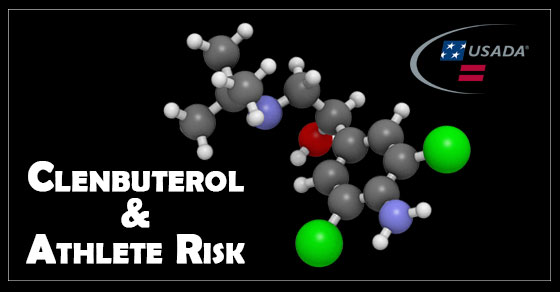 Originally released April 2011Updated August 2016
Originally released April 2011Updated August 2016Clenbuterol and the World Anti-Doping Agency (WADA) Prohibited List
Clenbuterol is a powerful drug sometimes used for performance-enhancement by athletes to increase lean muscle mass and reduce body fat. Listed on the World Anti-Doping Agency (WADA) Prohibited List, clenbuterol is classified under the category of other Anabolic Agents because it promotes muscle growth through anabolic properties.
Clenbuterol is not legally distributed in the U.S. and is not approved by the Food and Drug Administration (FDA). Athletes should also be aware and use extreme caution knowing that clenbuterol may still be prescribed clinically by physicians in some countries as a bronchodilator beta-2 agonist medication.
Clenbuterol and Meat Contamination
Further, there have been reports of clenbuterol use to promote growth in livestock, including cattle, lamb, poultry and swine. Such use is illegal in the U.S. and in Europe.
Consistent with numerous prior reported cases globally, the issue of illicit administration of clenbuterol to animals destined for food production can result in, under specific conditions, a positive sample from an athlete. WADA has issued specific warningsabout this problem in China and Mexico. Unfortunately, anti-doping authorities have no control over agricultural and food safety practices in these countries, and inadvertent ingestion remains an ongoing issue for athletes.
Clenbuterol and Athlete Risk Outside the U.S.
USADA wants to help athletes and athlete support personnel understand the potential risks. To USADA’s knowledge, due to strict regulatory and meat certification practices, a clenbuterol positive athlete sample has never been reported after consumption of meat produced in the U.S.
USADA urges athletes to use the utmost care and caution if eating meat while traveling abroad, and to be aware of the potential for contamination.
To reduce your risk of unintentionally ingesting clenbuterol through contaminated meat:
- Choose foods from a reputable food source.
- Avoid eating liver or liver derived products while overseas.
- Avoid eating unusual or exotic meat products.
Clenbuterol and Results Management
Despite the continuously improving analytical methods in sports drug testing, especially using sensitive mass spectrometry, it remains difficult to determine if clenbuterol has been deliberately administered or unintentionally ingested through contaminated meat.
Under the World Anti-Doping Code, clenbuterol is a non-threshold non-specified substance, meaning that any amount of clenbuterol detected in an athlete urine sample is reported as a positive test. Thus, it’s important to note that strict liability dictates an athlete has ultimate responsibility for what is in his/her system, regardless of its origin.
USADA will continue to keep the sport community aware of new developments regarding this issue as they develop.
References
Thevis M, Geyer L, Geyer H, Guddat S, Dvorak J, Butch A, Sterk SS, Schänzer W. Adverse analytical findings with clenbuterol among U-17 soccer players attributed to food contamination issues. Drug Test Anal. 2013 May;5(5):372-6.
WADA statement on Clenbuterol, June 15, 2011.
WADA statement on Clenbuterol, “Athletes must show caution due to contaminated meat.” November 23, 2011.
WADA Testing Figures, Accessed August 9, 2016.
Комментариев нет:
Отправить комментарий